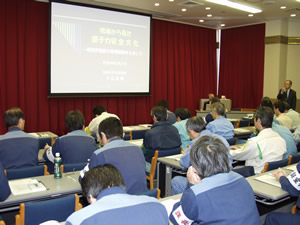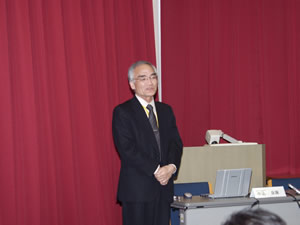
|
|
During the Safety Presentation
|
Approximately 40 employees of Kansai Electric Power Company's Takahama Nuclear Power Station and contractor’s staff attended.
The presentation began with opening remark from Nobuhiro Tanaka, Deputy Station Superintendent of Takahama Nuclear Power Station.
"Today is the second to this power station by the Safety Caravan.
"A peer review was also conducted in 2008 after which various proposals were made with regard to the strengths and weaknesses of this power station. Currently, improvements are being made in regard to both tangible and intangible aspects of the plant. A report concerning four items, including measures to reduce trouble, was submitted to the Fukui Prefectural government and the cities, towns, and villages at the end of last month. In order to implement these measures reliably, I believe the most important thing is the duty of each organization and individual to maintain awareness and endeavor in the aim to disseminate safety culture, and this applies not only to our own 500 employees but also to the approximately 2,500 personnel of contractor companies working at the power station.
"For today's lecture, we will hear from Professor Nakagome about the various 'experiences as seen from the worksite' obtained through activities involving the Kyoto University research reactor. As personnel who are similarly in charge of such a worksite, the topic is very close to us and we look forward to the professor's talk providing information that will be useful in our future activities."
After the opening remarks, Yoshihiro Nakagome, Emeritus Professor, University of Kyoto gave a presentation titled "Safety Culture as Seen from the Worksite -- via Experience in the Management of the Research Reactor Facility." |

|
|
Mr.Yoshihiro Nakagome, Emeritus Professor,
University of Kyoto
|
Since my entry into Kyoto University Research Reactor Institute (KURRI) in 1968 as an assistant, I have been engaged in safety management for the research reactor concurrently with my research activities. After many years of experience, I arrived at three of my own personal opinions concerning safety culture.
◆ First of all, what we know as safety culture is reared within the particular culture of a particular region. Japan has its own unique Japan-specific culture, and safety culture should be carefully nurtured within this context.
◆ Secondly, there exists no one single absolute solution in regard to safety. Each individual had ought to devote his or her full brain-power to thinking about clarification of the point of "for what purpose must we assure safety."
◆ Thirdly, safety culture is a "question of the soul." One's pride in and devotion to his/her work is extremely important.
At the time of the Great Hanshin-Awaji Earthquake of 1995, KURRI staff responded to the situation quickly and appropriately. Despite that the event occurred in the early morning, the related staff gathered spontaneously and without being told by anyone, voluntarily began inspecting the equipment. Awareness of "safety for the surrounding area residents" prevails among the staff, and they endeavor in their daily work with devotion, and I believe the appropriate actions at the time of emergency is a manifestation of this.
Through my long years of experience in management I have learned a great deal about the fundamentals of safety culture. I have learned to build relationships with local residents, to express appreciation by saying "thank you," how to make assessments, how to scold, the way responsibility ought to be, and above all, trust in the other party, devotion to work, to see things from the other party's perspective, and to understand the difference between "it ought to be possible" and "it is possible," and much more. Especially, communication on a daily basis is important.
From all these things, in order to promote safety culture, first of all we must seek to have a worksite where the results of the work can be accurately assessed. In addition, having pride and the sense of professional responsibility on the part of all personnel are indispensable, and it is important to endeavor in our work duties zealously. Furthermore, we must also be firmly aware of the ultimate goal of "safety management for the benefit of society." Thus said, as safety measures, we must take a myriad of diverse approaches with the mind-set of overall safety management, and must never forget that we must seek not only money, but when necessary we must also seek wisdom.
Comments from the questionnaires conducted after the presentation:
● The lecture touched on how we should proceed in order to build up safety culture and the attitude for endeavoring in work duties based on personal experience and I felt "yes, that it is it precisely," and on many points that is exactly how we should proceed hereafter, and I felt it was most informative. I intend to make use of today's lecture in my work hereafter and continue thinking about what I personally can do for the peace of mind of the local residents through safe operation of the power station.
● I believe this applies not only to those of us engaged in the nuclear field but to people in all walks of life and business, that "knowledge learned through management" is very much a matter of the preparedness of the managers and persons in responsibility. Thank you for the lecture.
● I believe that everyone possesses a great deal of theoretical knowledge on many topics, but there are many cases where the actions do not follow suit. From today's lecture I felt that I could thoroughly understand about taking action, basic ways of thinking, and "safety should be carried out based on these thoughts." It was very informative.
● Thank you for the most beneficial lecture with examples of case studies. I intend to take advantage of the talk by making amendments based on this lecture, starting from the things that I have the power to put into effect. Safety culture is a "question of the soul," and so I believe human relationships are very important. I hope to be able to forge better human relationships and promote safety culture in this way.
|







